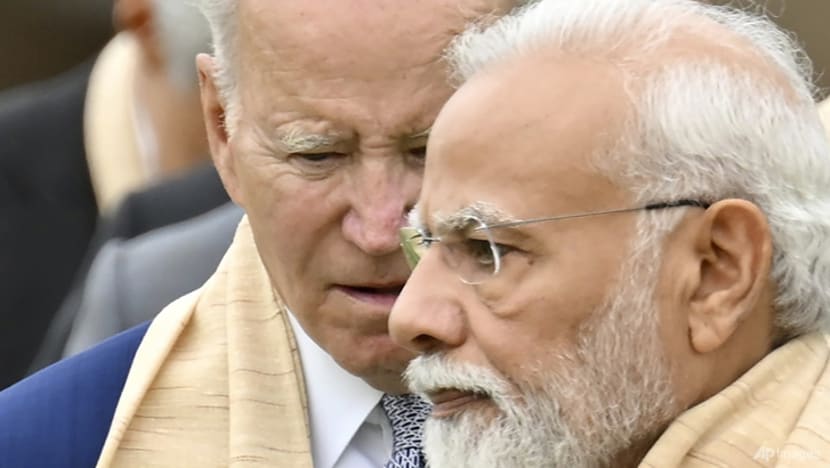How has the Global South shaped developments at the G20 summit?
The African Union’s permanent inclusion in G20 aims to amplify Africa’s – and the Global South’s – voices on the global stage, observers said.

U.S. President Joe Biden, center, Indian Prime Minister Narendra Modi, and other G20 leaders arrive to pay their tributes at the Rajghat, a Mahatma Gandhi memorial, in New Delhi, India, Sunday, Sept. 10, 2023. (AP Photo/Kenny Holston, Pool)
The “Global South” is a term that was used repeatedly at the G20 meetings over the weekend in New Delhi, India, with much of the summit’s agenda and declaration focused on developing countries, said observers.
“Clearly, the agenda and the declaration were focused very much on the challenges of the Global South. To that extent, (the G20 summit was) an extremely important event for the Global South,” said Mr Vikram Nehru, a senior fellow at the Foreign Policy Institute at Johns Hopkins University.
“There were concerns about food security, reforming the multilateral global institutions, financial stability … (and concerns about) the war in the Ukraine were about its implications for global stability.”
India's emphasis on inclusive growth and support for the developing world was evident at the G20 summit, particularly with the African Union being made a permanent member of the bloc, said observers.
After the permanent inclusion of the 55-member African Union in the G20, Indian Prime Minister Narendra Modi said: “Let us also do whatever we can for the development of the Global South”.
INDIA’S SUCCESS AT THE SUMMIT
Mr Modi has championed for India to be the voice of the Global South, both during the G20 summit and at the recent BRICS annual leaders’ meeting last month in Johannesburg. The BRICS bloc of developing nations include Brazil, Russia, India, China and South Africa.
“India must be credited for having an agenda which was squarely on global development issues. India also pushed and succeeded in having the African Union become a permanent member of the G20 – a really important outcome,” Mr Vikram told CNA’s Asia First on Monday (Sep 11).
He added that the multinational rail and shipping project connecting India with the Middle East and Europe, which was unveiled at the sidelines of the summit, will have important implications for South Asia, where many nations are seen as part of the Global South.
Analysts said the move, which will include infrastructure and alternative energy, could be seen as counterweight to China’s Belt and Road Initiative, albeit on a smaller scale.
The summit was a positive outcome for Mr Modi’s campaign to be re-elected for a third five-year term at the next general election, expected next year, observers added.
AFRICAN UNION’S INCLUSION
The African Union’s inclusion, proposed by Mr Modi, aims to amplify Africa’s – and the Global South’s – voices on the global stage, observers said.
“Having the African Union become a permanent member brings to balance some of the voices of the Global South. Increasingly, the African continent is going to become a very important player in global issues. It is afterall one of the largest commodity producers in the world,” Mr Mark Michelson, chairman of the Asia CEO forum at peer group forum IMA Asia, told CNA938’s Asia First.
He added there is enormous competition between China and the West to influence Africa, as the continent becomes increasingly pivotal as a supplier of rare earths and rare metals.
“These (commodities) are going to be critical in the future of the electric vehicle industry and the digital economy, which are rapidly expanding around the world. Both China, as well as the West, are keenly aware of this,” he said.
WORDING ON UKRAINE
In a surprise move at the summit, members agreed to soften the language on the Ukraine war, calling it “war in Ukraine” rather than “war against Ukraine”, failing to condemn Russia as aggressor.
Instead, the declaration highlighted the human suffering and economic impact the conflict has caused.
Experts said that the West may be struggling to win over the Global South, pointing to the refusal of many countries, including South Africa, India and China, to overtly condemn Russia’s invasion.
They added the declaration was a success for India, given the deep divisions among nations about the war.
Mr Michelson said that while the outcome was not ideal, it was still “much better than expected”.
“There was a compromise here, and there was language that everyone could accept to one degree or another,” he said. “They got an agreement and it was forward looking at ending the war and also talked about the impact of the war, especially on food (security).”
He added it was not necessarily a win for Moscow although the Russian G20 government negotiator Svetlana Lukash was quick to praise the declaration as “balanced”. This was because despite having a presence at the summit, Russia was left out of major discussions, Mr Michelson said.
With Brazil taking over the G20 chairmanship next year and South Africa taking the helm in 2025 – both are nations of BRICS and the Global South – observers expect the Global South to be high on the agenda for the bloc in the next few years.

















